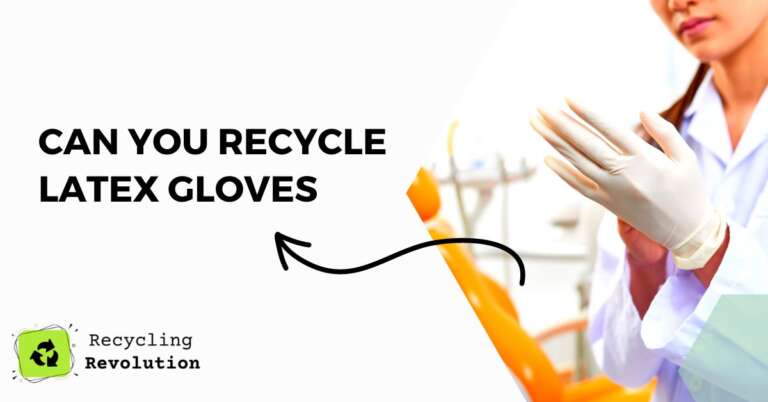When it comes to living an environmentally conscious lifestyle, there’s no question too small to consider. And today, I’m delving into one that’s been on many of our minds lately: Can you recycle latex gloves?
With the heightened usage of these gloves in recent times, particularly in healthcare and food service sectors, understanding the environmental footprint they leave behind is crucial.
tl;dr: No, you typically can’t recycle latex gloves through regular curbside recycling programs, but there are specialty programs and alternatives to ensure they don’t end up harming our environment.
The Problem with Recycling Latex Gloves
Understanding the Material
Latex gloves are made from natural rubber latex (NRL), a renewable resource derived from the Hevea brasiliensis tree. While they are biodegradable, they can take quite some time to break down, especially in landfills where conditions are not conducive to decomposition.
Why Regular Programs Don’t Accept Them
You might wonder, “Why not toss them in the recycle bin?” The issue is, most curbside recycling programs are set up to process common household recyclables like paper, plastic, and glass.
Latex gloves, however, can contaminate these streams and disrupt the recycling process.
Environmental Impact
It’s been estimated that over 150 billion disposable gloves are used annually in the U.S. alone. Without proper disposal methods, these gloves, while offering protection, can become a significant environmental concern.
The Proper Disposal of Latex Gloves
Now, if you’re a bit disappointed about the recycling limitations, fret not. Here’s where my advice comes in handy.
I recommend considering the following when disposing of latex gloves:
- General Waste Bin: Since latex gloves cannot be recycled through standard municipal methods, they should ideally go in the general waste bin.
- Composting: Yes, they are biodegradable. However, I recommend composting them only if you have an industrial composting facility nearby. Home composting won’t provide the conditions required to break them down efficiently.
- Specialty Recycling Programs: Some companies, like TerraCycle, offer specific recycling programs for latex gloves. I recommend researching to see if such a program exists in your area.
Alternatives to Latex Gloves
Reduce and Reuse
Given the challenges in recycling, the first step is always to reduce our consumption. Can you do without gloves for specific tasks? If safety and hygiene aren’t compromised, perhaps you can.
Biodegradable Options
There are gloves available in the market which are designed to break down more quickly than traditional latex gloves. Some options include gloves made from nitrile or vinyl.
I recommend researching brands and understanding their biodegradability claims before purchasing.
Reusable Gloves
For household tasks, consider using reusable gloves that can be washed and used multiple times. Not only are they cost-effective, but they also reduce the waste generated significantly.
Making the Change
The question of recycling latex gloves is emblematic of a larger issue: our consumption patterns. I recommend always thinking twice before using single-use items.
Even if recycling them is challenging, by reducing our consumption, reusing when possible, and disposing of them responsibly, we can make a tangible difference.
Note: While reducing glove usage might be possible for household tasks, in medical and certain professional settings, their usage is non-negotiable for safety reasons.
The Rise in Latex Glove Usage
A Global Phenomenon
With the global health concerns of recent years, the demand for personal protective equipment, including latex gloves, has skyrocketed.
It’s not just the medical field; even everyday consumers are using them more frequently. This surge in usage has led to an increase in waste, placing an even more significant burden on our already stretched waste management systems.
Diving Deeper into Latex
Chemistry of Latex
Latex in its natural form is a milky fluid that is derived from over 200 plant species. The rubber tree, Hevea brasiliensis, is the primary commercial source.
When we talk about latex gloves, the latex is processed to give it elasticity, strength, and other desirable properties. This processing involves adding chemicals that can impact how the gloves break down and can also pose challenges for recycling.
Latex Allergies
An aspect we cannot overlook is the concern of latex allergies. A section of the population is allergic to latex, which can lead to reactions ranging from mild skin irritation to more severe responses.
This has led to the rise of non-latex alternatives, like nitrile and vinyl gloves, which pose their own recycling challenges.
Beyond Recycling: Reducing the Impact
Innovative Solutions
Enterprising individuals and companies are coming up with unique solutions. For instance, certain research projects are exploring the possibility of converting used gloves into new plastic products, thus offering a sustainable method to repurpose them.
Economic Impact
It’s not just about the environment. The economic implications of latex glove usage are also substantial.
By finding efficient ways to recycle or reuse gloves, we can potentially create new industries and job opportunities.
Best Practices for Disposal
Segregation at Source
I recommend that latex gloves be separated from other waste at the source. This makes it easier to manage and process them, whether it’s for disposal or a specialized recycling program.
Disinfection
Given that gloves are often used for sanitary reasons, it’s essential to ensure they are free from contaminants. Used gloves should be safely contained and, if possible, disinfected, especially in medical settings.
Engage with Community Programs
Community-based programs sometimes have unique solutions based on local needs and capabilities. Engaging with such initiatives can provide insights into better disposal practices and may offer avenues for recycling that aren’t broadly advertised.
Educate and Advocate
Raising Awareness
One of the significant challenges is the lack of awareness about the issues surrounding latex glove disposal. By educating friends, family, and colleagues, you can play a role in reducing unnecessary waste and encouraging responsible disposal.
Lobby for Better Solutions
While individual efforts are vital, systemic change is often required for significant impacts. I recommend reaching out to local representatives, institutions, and organizations to advocate for better solutions for latex glove disposal and recycling.
Taking Ownership
Finally, while institutions and governments play a crucial role, as consumers and users, we also bear the responsibility. It’s up to us to be informed, make the right choices, and push for sustainable solutions in our communities.
Every glove might seem insignificant on its own, but collectively, our choices can shape the direction we take towards a sustainable future.
Conclusion
Can you recycle latex gloves? The short answer is no, not through regular recycling means. However, the more profound insight lies in understanding why and how we can maneuver around this challenge.
By being conscious consumers and making well-informed choices, we can tread a bit more lightly on our planet.
FAQ:
Are latex gloves biodegradable?
Yes, they are, but they can take a long time to decompose, especially in landfill conditions.
Can I compost latex gloves at home?
It’s best not to. Home composting doesn’t offer the conditions needed to break them down efficiently.
Are there any gloves that can be recycled?
Some specialty recycling programs accept latex gloves, but it’s best to research and find one that operates in your region.

